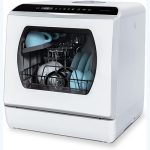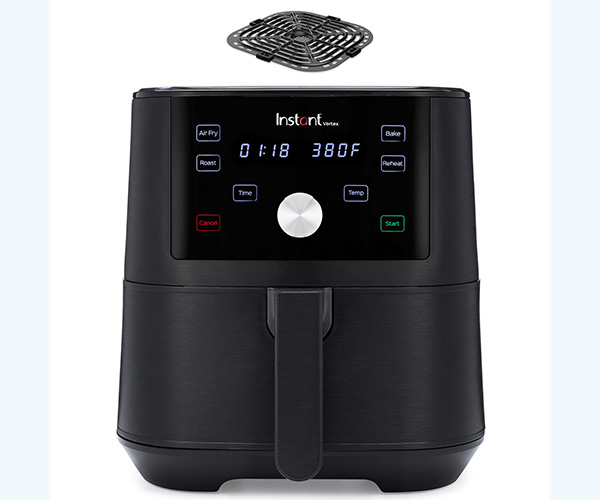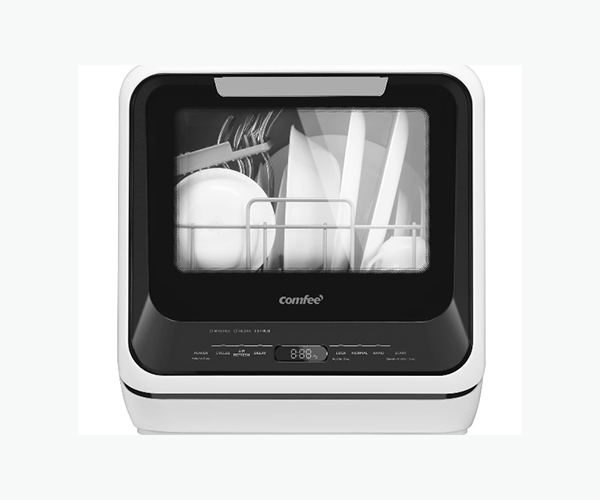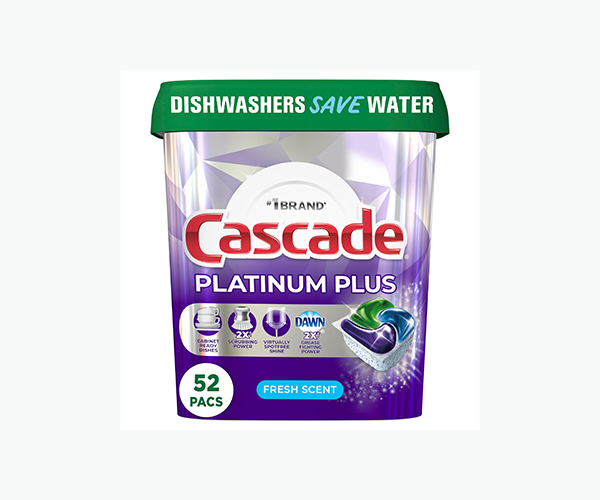Why Dishwasher Leaking Through Front Door?
Introduction
When it comes to household appliances, the dishwasher is a shining example of effectiveness and convenience. Leaks, especially those coming from the front entrance, are a frequent but confusing problem that can be frustrating and cause anxiety. This is particularly true for people who possess any normal appliance dishwasher, a 24-inch portable dishwasher, or a Criterion dishwasher. Not only do leaks indicate a problem with your kitchen’s reliable ally, but they also present a concern to the adjacent surroundings, with water damage and associated safety problems.
It’s critical to identify the underlying cause of these breaches. It’s not only about a stain on the floor; it’s about keeping your dishwasher operating at its best for as long as possible. The fundamentals of troubleshooting apply to all dishwashers, whether you have a sturdy, long-lasting Criterion dishwasher, a sleek, compact 24-inch portable dishwasher, or any other type of appliance dishwasher.
A clogged drain, a broken door gasket, or even a blocked air gap might all be the cause of a leak. Even though they are all widespread, each of these problems needs a unique strategy to identify and fix. We go into great detail in this extensive guide on how to locate and repair leaks in your dishwasher. Our goal is not just to provide you a short-term solution, but also to provide you the know-how to take care of your equipment and keep it functioning as an essential part of your everyday life.
Remember that these appliances are more than simply machines as we examine the typical causes of dishwasher leaks; they are essential parts of our homes that make our daily lives easier and our duties more enjoyable. As a result, taking careful and precise care of their problems is not only a question of repair but also evidence of our dedication to a functional home. Recognizing and fixing these leaks is a step in maintaining the efficiency and harmony of your home, regardless of the type of dishwasher you’re using—a 24-inch portable, a Criterion, or any other model.
In the sections that follow, we’ll walk you through the process of locating the leak’s source, talk about the most typical causes, and offer comprehensive fixes to make sure your dishwasher keeps running smoothly and effectively. Come along on this adventure of troubleshooting appliances with us as we turn this difficult activity into a chance for growth and learning.
Identifying the Source of the Leak
Determining the precise cause of a leak in your appliance dishwasher is essential, regardless of whether it’s a 24-inch portable dishwasher or a Criterion model. This step is important for maintaining the longevity and effectiveness of your dishwasher, not only for fast solutions. This comprehensive guide, designed for both normal and portable dishwashers, will assist you in determining the source of the leak.
Initial Inspection: Begin with a visual inspection of your dishwasher. Check for any obvious signs of damage or wear, especially around the door area. A leak can often originate from a compromised door seal, so pay close attention to this part. For portable dishwashers, ensure that the connections and hoses are secure and intact, as their mobility can sometimes lead to loosened fittings.
Understanding Dishwasher Cycles: Familiarize yourself with the various cycles of your Criterion dishwasher or portable dishwasher. Observe at which cycle stage the leak occurs. Is it during the initial water fill, mid-cycle, or during draining? This observation can be a significant clue. For instance, a leak at the beginning of a cycle might suggest an issue with the inlet valve, while a leak during draining could point towards a clogged drain or malfunctioning pump.
Door Gasket Check: The door gasket is a common culprit in appliance dishwasher leaks. Examine it for any signs of wear, tear, or deformation. In Criterion dishwashers and most 24-inch portable models, the gasket should form a perfect seal when the door is closed. Any gaps or damage can allow water to escape.
Inspecting the Float Switch: The float switch in your dishwasher controls the water level. If it’s stuck or malfunctioning, it could cause the dishwasher to overfill and leak. Check to ensure that the float moves freely and isn’t obstructed by utensils or debris.
Hose and Connection Inspection: For a 24-inch portable dishwasher, it’s essential to regularly check the hoses and connections. Since these dishwashers are moved frequently, the wear and tear on hoses can be more pronounced. Look for any kinks, cracks, or loose connections that could be the source of the leak.
Detergent Usage: Incorrect detergent usage can lead to excessive suds and overflow, causing leaks. Ensure you’re using the right type and amount of detergent for your model, be it a Criterion dishwasher or a portable one. This is especially important for high-efficiency models that require specific types of detergents.
Professional Assessment: If your initial inspection doesn’t reveal the source of the leak, or if you’re uncomfortable performing these checks, it’s wise to seek professional help. A skilled technician can provide a thorough assessment, especially for complex models like the Criterion dishwasher or specialized portable dishwashers.
You can locate the source of the leak in your dishwasher appliance by following these instructions. Recall that taking quick action to fix the problem not only stops additional damage but also prolongs the life of your dishwasher—whether it’s a 24-inch portable dishwasher or a Criterion model.
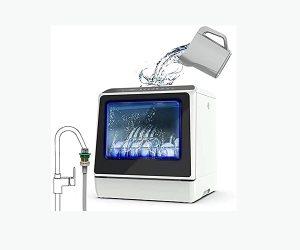
Common Causes and Solutions
Dishwasher leaks can be annoying, especially with devices like the 24-inch portable dishwasher or the Criterion dishwasher. Maintaining the longevity and effectiveness of your appliance dishwasher requires knowing the underlying problems and putting workable remedies in place. Here, we examine the common causes of these leaks and provide workable solutions.
A. Damaged Door Gasket in Criterion Dishwasher
The door gasket, a critical component in ensuring a watertight seal, is often the culprit in Criterion dishwashers. Over time, this rubber seal can wear out or get damaged, leading to water escaping during the wash cycle. If you notice your Criterion dishwasher leaking, inspect the gasket for any signs of wear or tear. A simple cleaning might do the trick for minor dirt accumulation, but if the damage is significant, replacing the gasket is the best course of action. This not only stops the leak but also extends the life of your dishwasher.
B. Blocked Air Gap in 24-Inch Portable Dishwasher
Portable dishwashers, like the popular 24-inch models, often face leakage issues due to a blocked air gap. This component is essential in preventing sink waste from backing up into the dishwasher. However, it can become clogged with debris over time. To resolve this, remove the cover of the air gap, located near the kitchen faucet, and clear out any obstructions. Regular maintenance of the air gap ensures smooth operation and prevents leaks in your portable dishwasher.
C. Clogged Drain in Appliance Dishwasher
A common issue across various appliance dishwashers is a clogged drain. Food particles, grease, and soap scum can accumulate, obstructing the water flow and causing leaks. To tackle this, first, disconnect the power to your dishwasher for safety. Remove the bottom rack to access the drain and unscrew the filter. Clean the filter thoroughly under running water to remove debris. For more stubborn clogs, a mixture of baking soda and vinegar, followed by hot water, can be effective. This simple yet effective cleaning routine not only resolves current leaking issues but also prevents future occurrences.
Preventive Measures and Regular Maintenance
Regular inspection and maintenance of your dishwasher, whether it’s a Criterion dishwasher, a 24-inch portable model, or any other appliance dishwasher, are vital. Keeping an eye on the door gasket, air gap, and drain can prevent most leaks. Additionally, using the right detergents and running the dishwasher according to the manufacturer’s guidelines can significantly reduce the risk of leaks.
In conclusion, using these remedies to address the common causes of dishwasher leaks not only resolves current issues but also protects your appliance from future problems. Recall that although do-it-yourself solutions work well for simple problems, professional assistance from an appliance repair business is advised for more complicated concerns, particularly with advanced models like the Criterion dishwasher or a 24-inch portable dishwasher.
When to Seek Professional Help
While most typical dishwasher problems, including leaks in a 24-inch portable dishwasher, a Criterion dishwasher, or any other regular appliance dishwasher, may be resolved at home, there are some situations that call for expert assistance. It’s critical to acknowledge the boundaries of your knowledge and the intricacy of some dishwasher issues.
Recognizing the Signs for Professional Intervention
- Persistent Issues After DIY Attempts: If you’ve followed all the recommended steps for fixing leaks or other issues in your dishwasher and the problem persists, it’s a clear sign that professional intervention is needed. This is especially true for sophisticated models like the criterion dishwasher, where the intricacy of components might require expert handling.
- Complex Mechanical Failures: Dishwashers, particularly advanced models like a 24-inch portable dishwasher, have intricate mechanisms. If you suspect a mechanical failure that goes beyond simple clogs or gasket issues, it’s time to call in the experts. Tinkering with complex parts without proper knowledge can lead to more damage or void warranties.
- Electrical Problems: Dishwashers are not just plumbing appliances but also electrical ones. Any signs of electrical issues, such as short-circuiting, should be immediately addressed by professionals. Attempting to fix these issues yourself can be dangerous and is not recommended.
- Water Damage Concerns: If your appliance dishwasher has caused significant water leakage leading to potential damage in your kitchen, professional assessment is crucial. Water damage can have far-reaching effects on your home’s structure and safety.
- When Under Warranty: If your dishwasher is still under warranty, it’s always best to opt for professional repair services authorized by the manufacturer. DIY repairs might void your warranty, leading to more expenses in the long run.
The Benefits of Professional Repair Services
- Expertise and Experience: Professionals bring a level of expertise and experience that is crucial for diagnosing and fixing complex issues in modern dishwashers.
- Safety: Handling electrical components and plumbing systems can be risky without proper training. Technicians ensure repairs are done safely.
- Time-Efficiency: A professional can often diagnose and fix problems more quickly than DIY methods, reducing the downtime of your appliance.
- Long-Term Solutions: Professionals not only fix the immediate problem but can also provide insights into maintaining your dishwasher to prevent future issues.
In summary
Dishwashers, whether they are conventional appliance dishwashers, 24-inch portable dishwashers, or criteria dishwashers, can be repaired on their own, but knowing when to call for expert assistance is essential to preserving the dishwasher’s lifespan and performance. Professional technicians may save you time and save future problems by providing the knowledge, security, and dependability required to guarantee your dishwasher keeps operating at its best.

FAQ: Addressing Common Concerns About Dishwashers
1. What are the key features to look for in a Criterion dishwasher?
- Answer: When selecting a Criterion dishwasher, consider these essential features: energy efficiency, which reduces electricity and water usage; noise level, especially important in open-plan living spaces; adjustable racks for accommodating various dish sizes; and a soil sensor that adjusts the wash cycle based on how dirty the dishes are. Criterion dishwashers often come with multiple wash cycles, providing flexibility for different cleaning needs.
2. How does a 24-inch portable dishwasher differ from a built-in model?
- Answer: A 24-inch portable dishwasher offers the convenience of mobility and doesn’t require a permanent installation, making it ideal for renters or those with limited kitchen space. Unlike built-in models, portable dishwashers can be stored away when not in use. They typically connect to a kitchen faucet and have wheels for easy movement. However, they might have a smaller capacity compared to standard built-in dishwashers.
3. Can I install a Criterion dishwasher myself, or do I need professional help?
- Answer: Installing a Criterion dishwasher can be a DIY project if you have basic plumbing and electrical skills. The process involves connecting water supply and drain lines, as well as ensuring proper electrical connections and leveling. However, if you’re not confident in your abilities or if the installation requires any modifications to your kitchen cabinetry or plumbing, it’s advisable to seek professional help to ensure a safe and correct installation.
4. What maintenance does a 24-inch portable dishwasher require?
- Answer: To maintain a 24-inch portable dishwasher, regularly clean the filters and check the spray arms for clogs. It’s also important to clean the seals and edges to prevent leaks and odors. Using a dishwasher cleaner or a vinegar rinse can help remove any build-up inside. Additionally, ensure the wheels and connectors are in good condition for smooth operation.
5. Are there specific detergent requirements for an appliance dishwasher?
- Answer: Most appliance dishwashers, including Criterion models, are designed to be used with automatic dishwasher detergents. Avoid using regular dish soap as it can cause suds overflow. Tablets, powder, or liquid detergents specifically made for dishwashers are recommended. Some models may also have recommendations for rinse aids to improve drying efficiency.
6. What should I do if my dishwasher is leaking?
- Answer: If your dishwasher, whether it’s a Criterion model or a 24-inch portable dishwasher, is leaking, first check for simple causes like overloading, improper detergent use, or clogged filters. Inspect the door seal for any damage and ensure the appliance is level. If these checks don’t resolve the issue, it might be due to a more complex problem like a faulty pump or hose, in which case consulting a professional technician is advisable.
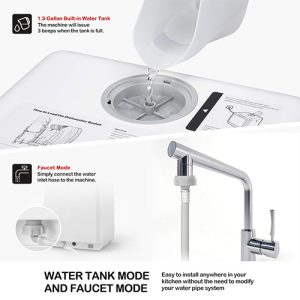
Conclusion
In conclusion, fixing a leaky dishwasher necessitates a combination of awareness of appliance dishwashing mechanics and skill, especially when it comes to types like the Criterion dishwasher or a 24-inch portable dishwasher. Finding the leak’s source and putting the right solution in place are the first steps in not only solving an urgent issue but also preserving the durability and functionality of your device.
First and foremost, it’s important to understand that every dishwasher has different maintenance requirements, regardless of whether it’s a standard dishwasher renowned for its durability or a little 24-inch portable dishwasher valued for its portability. Frequent inspections and prompt repairs help save little problems from growing into larger breakdowns. Given that appliance dishwashers are essential to the efficient operation of our daily schedules, taking a proactive stance is particularly crucial.
Furthermore, being aware of the typical problems dishwashers may encounter—like damaged door gaskets, obstructed air gaps, or clogged drains—allows users to respond quickly and efficiently. For example, a straightforward chore like clearing the drain or air gap in your Criterion dishwasher can spare you the trouble and expenses related to water damage. In a similar vein, you may prolong the life of your 24-inch portable dishwasher by knowing when to replace a worn-out component.
It’s crucial to recognize when a problem is beyond the scope of do-it-yourself solutions, though. In these situations, getting professional assistance is not only a need but also a choice. Expertise and accuracy are provided by professional appliance repair services, guaranteeing that your dishwasher—whether it is a Criterion model or not—will operate at its best again.
Essentially, the process of maintaining and repairing a dishwasher, irrespective of its kind or manufacturer, involves finding a balance between relying on oneself and hiring a professional. It all comes down to knowing the little quirks of your machine and responding quickly to make sure every cycle goes without a hitch, leaving your dishes spotless and your schedule intact.






